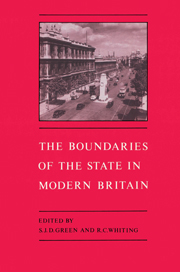Book contents
- Frontmatter
- Contents
- List of figures
- List of tables
- List of contributors
- Acknowledgements
- 1 Introduction: the shifting boundaries of the state in modern Britain
- Part I The state and political theory
- 2 Political thought and the state
- 3 ‘Boundaries’ in theoretical language about the British State
- 4 The twilight of the British state?: Henry Dubb versus sceptred awe
- 5 Thinking about the state and the economy
- Part II The economy
- Part III Welfare and social policy
- Part IV Conflict and order
- Part V Religion and morality
- Index
2 - Political thought and the state
Published online by Cambridge University Press: 18 March 2010
- Frontmatter
- Contents
- List of figures
- List of tables
- List of contributors
- Acknowledgements
- 1 Introduction: the shifting boundaries of the state in modern Britain
- Part I The state and political theory
- 2 Political thought and the state
- 3 ‘Boundaries’ in theoretical language about the British State
- 4 The twilight of the British state?: Henry Dubb versus sceptred awe
- 5 Thinking about the state and the economy
- Part II The economy
- Part III Welfare and social policy
- Part IV Conflict and order
- Part V Religion and morality
- Index
Summary
One of the most striking features of writing on British politics and society from the early 1940s through to the late 1960s was the wide-spread silence that prevailed on the theme of the underlying nature, powers and purposes of the state. Britain's governors during that period waged a world war against one totalitarian state and a cold war against another. They withdrew from control of a global empire and devised ambitious state structures for many of Britain's ex-colonial possessions. They engaged for the first time in large-scale fiscal and monetary management, nationalised (and denationalised) major industries, introduced mass compulsory secondary education, centralised and bureaucratised many traditionally local services, and set up a welfare state designed to protect its citizens against want from the cradle to the grave. In virtually no other period of British history were the powers and functions of government so radically extended and redefined, and in no other period were the roles of state, citizen, economy, society and private voluntary associations more drastically remoulded. Yet, in striking contrast to what the naive wanderer along the highway of history might have expected, there were few attempts to analyse or justify these new powers and functions in theoretical terms. Major analytical or speculative works about the state in this period can almost literally be numbered on the fingers of one hand (and of these one was widely dismissed as ‘the unhappy work of an ill man’, while another was a work of fiction largely read by children).
- Type
- Chapter
- Information
- The Boundaries of the State in Modern Britain , pp. 15 - 28Publisher: Cambridge University PressPrint publication year: 1996
- 4
- Cited by



